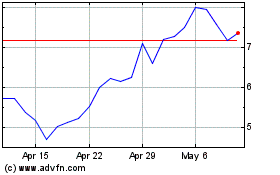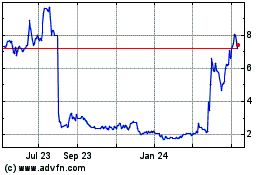MD Anderson Cancer Center and National Institutes of Health to Fund Clinical Trial Combining Two Proprietary Mesoblast Techno...
December 06 2016 - 6:00AM

Mesoblast Limited (Nasdaq:MESO) (ASX:MSB) today announced that MD
Anderson Cancer Center (MDACC) in Texas and the United States
National Institutes of Health (NIH) will fund a clinical trial
combining Mesoblast's two synergistic proprietary
technologies, Mesenchymal Precursor Cell (MPC)-based expansion
and ex-vivo fucosylation of hematopoietic stem cells (HSCs) for
cord blood transplantation in cancer patients. The trial will
provide clinical data on whether the combination of these two
technologies synergistically facilitates more rapid cord blood HSC
engraftment for bone marrow transplant patients than can be
achieved by either technology alone.
The number of allogeneic bone marrow transplants
performed globally each year could be substantially increased
beyond the current 30,000, for cancer and non-cancer indications,
if safe and effective alternative sources of allogeneic HSCs are
available, such as cord blood, for patients who cannot find a
matched donor. Unfortunately, cord blood transplants are associated
with prolonged engraftment times due to insufficient
numbers and inadequate homing capacity of cord blood HSCs,
adversely impacting their clinical outcomes. Combining Mesoblast's
proprietary technologies using MPC-based expansion plus ex-vivo
fucosylation of cord blood HSCs aims to overcome the two
key limitations to using cord blood for rapid, early engraftment
and bone marrow reconstitution in adult bone marrow transplant
patients. This novel clinical strategy has the potential to
significantly increase the number of patients who can receive
unrelated donor transplants.
Previously, Mesoblast conducted a Phase 2 clinical
trial which demonstrated that transplantation of HSCs from
MPC-expanded cord blood resulted in a reduced engraftment time,
from a median of 24 days for placebo-treated cells to a median of
15 days for co-cultured cells.i Separately, another Phase 2
clinical study showed that transplantation of fucosylated, but
non-expanded, cord blood HSCs also resulted in a reduced median
engraftment time of 17 days.ii More recently, preclinical
results from a group led by Dr Elizabeth J. Shpall, Director of the
Cell Therapy Laboratory and a Professor in the Department of Stem
Cell Transplantation at MDACC, where MPC-based expansion and ex
vivo-fucosylation technologies were combined, showed a very rapid
engraftment time of approximately seven days.
“Our data suggest that combining Mesoblast’s
MPC-based HSC expansion and ex vivo fucosylation technologies may
be the optimal clinical strategy for rapid engraftment of cord
blood transplants, potentially making cord blood transplantation a
real option for many desperate patients who cannot find a suitable
alternative,” said Dr Shpall.
The new trial of up to 25
patients, entitled ‘Cord Blood Ex-vivo MPC Expansion Plus
Fucosylation to Enhance Homing and Engraftment’, is supported
by a grant from the NIH National Cancer Institute (NCI Grant R01
CA061508-19) and will be led by Dr Amanda Olson, Assistant
Professor, Department of Stem Cell Transplantation and Dr Shpall at
MDACC. If the results of the combination study are positive,
Mesoblast's proprietary ex vivo-fucosylation technology may be
incorporated into the company's Phase 3 program of MPC-expanded
HSCs.
About HSC Transplantation Treatment of
Patients with Advanced Blood CancersMany patients with
advanced blood cancers, such as acute myeloid leukemia, require a
stem cell transplant to repopulate bone marrow HSCs after treatment
with high dose chemotherapy. Patients typically undergo transplant
with blood stem cells taken from the bone marrow or peripheral
blood of a donor with a matched tissue type. However, it may be
difficult to find a matched donor, especially for patients who are
part of a racial or ethnic minority. While transplants using cord
blood-derived stem cells do not require the same degree of donor
matching as blood and marrow, this approach has had limited success
due to the low yield of stem cells in cord blood and their reduced
ability to localize within the recipient’s bone
marrow.
About Ex-Vivo Fucosylation
TechnologyEx-vivo fucosylation is the addition of the
sugar fucose to surface receptors on cells, including HSCs and
mesenchymal lineage stem cells. This process modifies receptors on
these cells by adding carbohydrate or sugar sequences which allows
them to be recognized by and bound to their ligands present on
endothelial cells lining blood vessels in inflamed tissues and in
human bone marrow. As a result, such modified cells
demonstrate enhanced homing properties to bone marrow or to tissues
that are inflamed. Mesoblast has exclusively licensed the ex-vivo
fucosylation technology, which was developed at the Harvard
Medical School by Dr Robert Sackstein, for use with HSCs and with
allogeneic mesenchymal lineage cells. This cell targeting
technology resulted in engraftment of systemically infused human
HSCs into mouse bone marrow at a rate ten times that of unmodified
human HSCs.iii
About MesoblastMesoblast Limited
(Nasdaq:MESO) (ASX:MSB) is a global leader in developing innovative
cell-based medicines. The Company has leveraged its proprietary
technology platform, which is based on specialized cells known as
mesenchymal lineage adult stem cells, to establish a broad
portfolio of late-stage product candidates. Mesoblast’s allogeneic,
‘off-the-shelf’ cell product candidates target advanced stages of
diseases with high, unmet medical needs including cardiovascular
diseases, immune-mediated and inflammatory disorders, orthopedic
disorders, and oncologic/hematologic conditions.
i N Engl J Med, 2012; 367:2305-15ii
Blood, 2015; 124(29): 2885-2892iii Nature Medicine,
2008; 14: 181-187
Forward-Looking StatementsThis
press release includes forward-looking statements that relate to
future events or our future financial performance and involve known
and unknown risks, uncertainties and other factors that may cause
our actual results, levels of activity, performance or achievements
to differ materially from any future results, levels of activity,
performance or achievements expressed or implied by these
forward-looking statements. We make such forward-looking statements
pursuant to the safe harbor provisions of the Private Securities
Litigation Reform Act of 1995 and other federal securities laws.
Forward-looking statements should not be read as a guarantee of
future performance or results, and actual results may differ from
the results anticipated in these forward-looking statements, and
the differences may be material and adverse. You should read this
press release together with our risk factors, in our most recently
filed reports with the SEC or on our website. Uncertainties and
risks that may cause Mesoblast's actual results, performance or
achievements to be materially different from those which may be
expressed or implied by such statements, and accordingly, you
should not place undue reliance on these forward-looking
statements. We do not undertake any obligations to publicly update
or revise any forward-looking statements, whether as a result of
new information, future developments or otherwise.
For further information, please contact:
Julie Meldrum
Corporate Communications, Mesoblast
T: +61 3 9639 6036
E: julie.meldrum@mesoblast.com
Schond Greenway
Investor Relations, Mesoblast
T: +1 212 880 2060
E: schond.greenway@mesoblast.com
Mesoblast (NASDAQ:MESO)
Historical Stock Chart
From Mar 2024 to Apr 2024

Mesoblast (NASDAQ:MESO)
Historical Stock Chart
From Apr 2023 to Apr 2024
